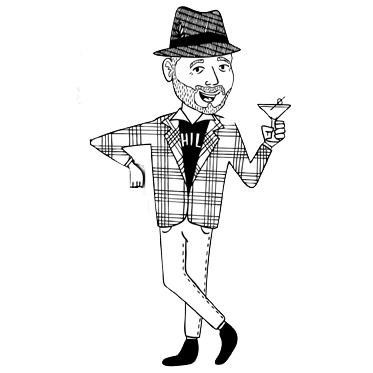 I did a piece for the Philly Post today (Philly Mag’s daily blog) about the bird that inspired Edgar Allan Poe’s The Raven. It’s a pretty cool piece. Check it out, and if you dig it, please spread the word by clicking recommend at the top of it or retweeting it. Thanks!
I did a piece for the Philly Post today (Philly Mag’s daily blog) about the bird that inspired Edgar Allan Poe’s The Raven. It’s a pretty cool piece. Check it out, and if you dig it, please spread the word by clicking recommend at the top of it or retweeting it. Thanks!
Doing this piece gave me a chance to interview Edward Pettit (above), the self proclaimed “Philly Poe Guy” that I mention in the piece. There was a lot of cool stuff in the interview that didn’t really work itself into the fairly narrow scope of the piece, but I thought some of you might find it interesting, so I’m going to include a bit of it here.
JGT: Poe met with Dickens for a short while in Philadelphia, in 1842 at the US Hotel. What did they talk about?
PETTIT: They had a lot in common to talk about regarding copywrite. The laws were so loose, and the authors wanted their money. And of course, Poe is looking for a favor. He wants Dickens to talk to publishers in England and try to get published over there. Dickens tried and failed. That was probably Poe’s real motive for talking to Dickens.
 JGT: Was Poe the kind of guy who wrote in a fury, or did he sort of write as it came to him?
JGT: Was Poe the kind of guy who wrote in a fury, or did he sort of write as it came to him?
PETTIT: He was simply writing all of the time. We know he had a problem with drinking, but there is no way he was an alcoholic. He was writing every single day. If he was a total drunk, he could not have written as much as he did. Not in a maniacal fury, just doggedly pursuing it every day. Just writing. He sits down every day, and works and corrects things he wrote.
JGT: Had his wife gotten ill by the time he spoke with Dickens? (Poe’s wife, Virginia Clemm Poe, contracted TB in 1842 and died of it in 1847).
PETTIT: She had just become ill. The poetical topic in the world is the death of a beautiful woman. His mother ides when he’s young. His foster mother dies of tuberculosis. His wife comes down with TB and dies. If you’re a woman and Poe loves you, you’re doomed. That really affects what he writes. You can see all these beautiful young women in his stories dying.
They had a very successful, very loving marriage. He devoted his life trying to take care of her.
JGT: You are working on a book about how Philadelphia shaped Poe’s works. How did Philly affect Poe?
PETTIT: I believe the time he spent in Philadelphia was crucial. He would not have written some of his greatest works had he not been in Philadelphia. There was a literary culture here that I call Philadelphia gothic. People talk about American gothic, well gothic culture is from Philadelphia. Poe is very aware of Charles Brockton Brown. Great novel called Weiland. Real dark, nasty stories. They are the first dark gothic works in America. European gothic tradition is all about aristocrats, the supernatural, and ancestral curses. In American gothic you don’t have to worry about the spirits of some ancestor coming to murder you, you have to worry about your crazy husband killing you, or the serial killer next door. There are more American gothic works published in Philadelphia than anywhere else in America.
Poe is writing Gothic stories before coming to Phialdelphia in the European tradition. All of a sudden, Poe lives in Philly for about a year or two, and his stories begin to change. They are no longer supernatural , the threat could be domestic. Even William Wilson, the threat comes from within the guys own self. Had he settled in New York, where he went to after Philly, I don’t think he would have started in this strain. That tradition wasn’t up there in New York. It’s here in Philadelphia.
 This is neither here nor there, but I was working on a 50-50 round, and thought about using Bobby the Brain Heenan for it. Well, I decided I couldn’t really use The Brain because too many of his lines contained wrestlers names, but I was laughing my head off at some of his one-liners, so I thought I’d share. He and Gorilla Monsoon were the greatest 1-2 combo is announcing history for any sport, if you ask me. Keep in mind, he was the ultimate bad guy wrestling manager so he wasn’t particularly politically correct.
This is neither here nor there, but I was working on a 50-50 round, and thought about using Bobby the Brain Heenan for it. Well, I decided I couldn’t really use The Brain because too many of his lines contained wrestlers names, but I was laughing my head off at some of his one-liners, so I thought I’d share. He and Gorilla Monsoon were the greatest 1-2 combo is announcing history for any sport, if you ask me. Keep in mind, he was the ultimate bad guy wrestling manager so he wasn’t particularly politically correct.








